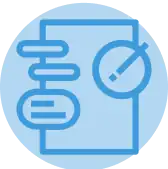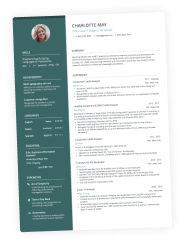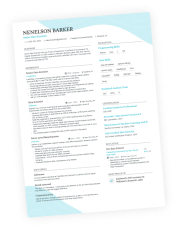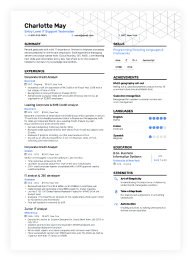Workplace success is a chain reaction. Happy customers need high-quality final products (or services), which most often depend on the team.
The team's efficiency and productivity depend on their relationships, which are built, nurtured, and sustained thanks to communication skills.
So, next time you see a job advert that lists "excellent communication skills", don't underestimate this requirement.
Nowadays, every industry needs good communicators. That's why employers are always on the lookout for candidates, who excel in verbal, non-verbal, and various types of communication.
In this Enhancv guide, we'll answer some of the most urgent questions you have about your CV communication skills.
- The many faces of communications: why are candidates with this skill set 124% more likely to get hired?
- The art of creating a communications-focused CV;
- Top 50 skills your CV needs to detail how you communicate and listen to ideas;
- How to describe your communication skills without diving into clichés (e.g. "I'm a good communicator")?
- CV sections to help you stand out as the most qualified candidate for the role.
What are communication skills
Communication skills are an umbrella term that depicts your abilities to:
- present ideas, thoughts, opinions, or feelings;
- listen intently, respond, provide, or receive feedback;
- share and exchange information, concepts, or instructions.
Communication skills are soft or interpersonal skills. You've developed them thanks to your whole life experience.
It may be a bit more difficult to quantify your communication skills across your CV, as how do you measure that you're a good communicator?
We'll get into more tips and tricks on how, in the next part of this guide, but for now, remember the four main types of communication skills:
- Verbal communication skills - or the spoken word;
- Non-verbal communication skills - body language, eye contact, etc.;
- Written communication skills;
- Visual communication skills - a picture is worth a thousand words, as they say.
Why are communication skills wanted by recruiters on your CV
Communication skills are a must for any employer, as they are a huge asset to the organisation.
For starters, communication skills:
- Drive effective collaboration and foster teamwork - excellent communicators can work with other people and departments to reach organisational targets.
- Create innovation and growth - the way you express your ideas and stay open to new lines of thought is what ultimately creates change with a positive impact all around.
- Resolve conflicts and enhance decision-making - effective communication and listening of both sides of the argument allows for solutions that benefit all.
- Promote leadership - to lead, you need to clearly state your vision, motivate and inspire others, and mediate and guide others along the way. In the end, everyone has to understand what's expected of them to reach the organisational objectives.
- Improve client relationships - customer satisfaction depends on professionals' abilities to build trust and address timely customer concerns. Communication skills would allow you to carry out better sales pitches and presentations, or be a more successful negotiator.
Your communication skills would also have an impact on the big picture and the brand image. This particular skill set is crucial to:
- establishing the operational principles (e.g. management command chain and objectives);
- maintaining a healthy workflow (e.g. sharing information and task delegation);
- sustaining a healthy work environment (e.g. boosting employee morale and preventing conflict).
What skills, activities and accomplishments help you highlight your communication skills
Verbal communication skills
- Clear and concise speech - you've probably noticed how when you take the time to articulate your ideas (even if they are quite complex), people tend to listen. Being a confident speaker is all about those small details: from your tone and pitch to the pacing and the words you use. Within your CV, pinpoint specific examples of when your direct communication skills have contributed to business success.
- Public speaking and presentation skills - speaking in front of any audience can be tough, we know. That's why recruiters are keen on having candidates with such experience. Quantify any public speaking engagements you've had (e.g. workshops or seminars) and/or awards for your oratory skills. Make sure to mention the topics you presented and the actual impact your speech has had on your audience.
- Persuasion and negotiation - it’s how you present convincing arguments to win over others so that everyone is on the same page. Understanding different viewpoints, managing expectations, and staying patient all play a crucial role in the negotiation process. Within your CV experience section, list instances where you have had to influence clients, stakeholders, or your team to accept your solutions.
- Assertiveness and confidence - it's the way you talk that can sometimes impact the team dynamics. Staying confident in yourself and your team's abilities would help you reach 99% more shared goals. On your CV, you can describe cases where you've stood up for your team or shared your ideas freely.
- Feedback - involves your ability to both give constructive feedback (by staying objective and sensitive to individual needs) and receive feedback (professionally and aiming to make the most out of it).
- Active listening - your ability to carefully listen to others' perspectives, reflect on what has been said, and respond thoughtfully. Active listening is about staying engaged in the conversation by asking questions. When you give the speaker your full attention, you're ultimately helping them feel heard and appreciated. Pinpoint on your CV how your active listening skills have helped you prevent a potential conflict. Remember that being a great communicator starts with learning how to listen.

17 more verbal communication skills (some are outside the box)
- Acting
- Conference presentations
- Conversational skills
- Debating
- Eloquence
- Improvisation
- Interviewing
- Meetings
- Motivational speaking
- Networking
- Online communication tools
- Relationship building
- Social skills
- Storytelling
- Vocabulary proficiency
- Video Calls
- Virtual meeting etiquette
Interpersonal Communication
Your abilities to work with other people are mostly thanks to the soft skills you have as a communicator, like
- Adaptability and flexibility - adjusting your communication style based on different audiences or changing environments. Describe within the projects section of your CV, situations where you've had to communicate across change management. What did you do to ensure your communication was received and accepted?
- Teamwork and collaboration - think of instances where you've worked with colleagues with different perspectives, but, in the end, reached a shared goal or objective. Brownie points for showcasing how you've streamlined your work digitally and coordinated remote tasks.
- Conflict management and problem-solving - it's how you've resolved disagreements or disputes (using logic, creativity, mediation, etc.) to come up with a mutually beneficial solution. Summarise on your CV the strategies you've used to resolve problems and how this has benefited the company (e.g. by boosting morale, improving overall job satisfaction, etc.).
- Leadership - involves an array of skills like delegation and feedback, coaching and mentoring, counselling and decision-making. Great leaders have a vision and strategy in mind, which they communicate and achieve, by motivating others. Personal leadership skills include approachability, reliability, persistence, etc. List on your CV cases where you've had to manage a team, project, or specific program. Make sure to include tangible metrics of your success as a leader - this could sometimes be a high retention rate of colleagues.
- Empathy - understanding, sharing, and valuing the perspectives and feelings of another person. Hinting at your emotional intelligence, this skill set also remarks how you actively listen to respond: with sensitivity and compassion. For example, you could quantify your empathy skills by showcasing situations of how you've guided coworkers through difficult times.
- Friendliness - many underestimate the power of a positive attitude in nurturing a healthy (and effective) work environment. In reality, friendly colleagues build a sense of trust and respect, and aim to make everyone feel celebrated. Your positive demeanour can be best demonstrated during the interview stage, only if relevant to the job or industry you're applying for.
- Honesty - this particular skill set also hints at your values as a professional, like authenticity, responsibility, accountability, reliability, transparency, etc.

5 more personality traits for better communication
- Attention-to-detail
- Imagination
- Open-mindedness
- Proactivity
- Quick thinking
One more thing, before we move on to the next type of communication skills. We’ve prepared the top customer service abilities, so your application always stands out.

13 customer service skills for your CV
- Client relationship management
- Client acquisition
- Customer inquiries
- Customer retention
- Complaint handling
- Consumer engagement
- Maintaining a positive attitude
- Outbound calls
- Outreach campaigns
- Phone Skills
- Pitching
- Sales
- Technical support
Written communication skills
- Spelling and grammar - your ability to produce error-free, concise writing. You've mastered the art of syntax, structures, and tone of voice. The best way to demonstrate your writing skills is via your grammatically correct CV, which uses a professional tone, and links to various samples of your writing (e.g. company newsletters, social media posts, articles, etc.).
- Report and proposal writing - this involves various types of documents, like business analysis, financial reports, pitch decks, etc. If it's possible - include links to sample documents you've written, alongside the crucial business projects they've impacted.
- Technical writing - it's all about presenting and explaining complex concepts to non-technical stakeholders. Think back on all the documents and user manuals you've created, how did you go about breaking down those complex ideas in layman's terms?

20+ samples of your written communication
- Advertising copy
- Blogging
- Business correspondence etiquette
- Content writing
- Copywriting
- Creative writing
- Editing and proofreading
- Email writing
- Investigative writing
- Legal writing
- Marketing copy
- Outlining
- Presentation writing
- Playwriting
- Poetry writing
- Press release writing
- Screenwriting
- Social media writing
- Speech writing
- Summarising
- Translation
Non-verbal communication skills
It's a bit impractical to show your non-verbal communication skills on your CV, as these abilities involve:
- Body language
- Cultural awareness
- Eye contact
- Facial expressions
- Gestures
- Mirroring
- Posture
- Professional appearance
- Spacial awareness
- Tone of voice

PRO TIP
Show, don't tell! The best way to showcase your non-verbal communication skills is during your interview.
Your non-verbal communication skills would help recruiters to feel more comfortable around you, so they can better understand your expertise.
Visual communication skills
Your skill to visually communicate your ideas involves using design principles to create:
- Animations and presentations;
- Graphics and infographics;
- Graphs and charts;
- Icons and symbols.

PRO TIP
Within your CV header, feature links to any visual communication elements (e.g. presentations and animations) you’ve created.
How did they help your organisation win projects or new clients?

How to demonstrate communication skills on your CV
- Take the time to assess job requirements to match specific advert communication keywords (e.g. certifications, degrees, job titles) with your experience.
- Quantify your communication skills with your achievements. Use concrete metrics to show your success and accomplishments, when possible.
- Your CV is an excellent instrument to demonstrate your written communication skills. Make sure your expertise is precise and easy to understand. Double-check your CV for spelling or punctuation mistakes, and ensure you are using proper grammar and a professional tone.
- Don't include an endless list of your communication talents in the skills section. Instead, focus on the ones that are most impressive for the role you're applying to and scatter them all through your CV.
- Be honest about how you've used your communication skills to share ideas and collaborate, solve problems, and reach organisational goals.
Example 1: Demonstrate communication skills in the experience section
The experience section should showcase how you use your communication skills to succeed in the workplace.
Make sure to start each experience bullet with a strong action verb, followed by your achievements. Quantify those with a tangible metric, when possible, as in the example below:
- •Executed +30 communication campaigns within a year, resulting in a 65% increase in brand awareness
- •Spearheaded a social media communication campaign that drove sales of 15 products to soar by 150%
- •Orchestrated crisis communication efforts, collaborating closely with the media to swiftly transform audience perceptions from negative to neutral in less than 24 hours
- •Cultivated trust and rapport with six new clients, leading to my promotion to the role of Key Account Manager
Example 2: Demonstrate communication skills in the CV summary section
Prioritise the most critical communication skills towards the top of your CV, in your summary.
The CV summary is those three to five sentences that highlight your most impressive and relevant skills and experience.
Best practices point out that you should avoid lengthy paragraphs and long sentences when writing your summary.
Instead, clearly and concisely emphasise your achievements, thanks to your excellent communication skills.
Example 3: Show your communication skills in your achievements sections
Within the achievements section, highlight accomplishments that are linked with your communication skills.

PRO TIP
The achievements section is also the one within which you could shine a light on your transferrable skills - or those talents that could be relevant to any role, no matter the industry.
Make sure to answer how these skills could be beneficial to your new employers.
In the example below, the business development professional has highlighted these communication skills:
- sales and pitching;
- verbal communication and empathy;
- networking and relationship building.
Example 4: Demonstrate the skill through other sections of your resume
If you happen to have less professional experience or would like to showcase diversity in your communication skills, include some of these CV sections:
- Education and certifications - show your dedication to becoming a better communicator with any relevant coursework and training you have had.
- Language skills - showcasing your multilingual proficiencies and hinting at your cross-communication skills. Always remember to include what level you are at, whether it's by including a certificate from an accredited institution or via self-assessment.
- Volunteer work - make sure to detail the roles and responsibilities you've had and how they've developed your communication skills.
Example 5: Use a separate skills section
As you may have heard, your skills section should best include all the technologies you're apt at using (or hard skills). That doesn't mean you should leave out your communication skills from it.
Instead, feature any digital communication and virtual meeting tools (e.g. Slack, Zoom, Trello, etc.) you feel comfortable using and are relevant to the role.
The technical skills section could also be an excellent space for communication professionals, like in the example below.
Communication skills: key takeaways for your CV
- Communication skills help your application stand out, that’s why you should select the most relevant ones to the role or industry you’re applying for and scatter them all through your CV.
- Recruiters care about seeing the actual impact of your communication skills, so make sure to quantify them via achievements and tangible metrics (when possible).
- There are various types of communication skills you could feature on your CV: remember to select the ones which would be the most impressive and beneficial to your potential employers.
- Use the skills section to list any communication technologies you’re apt at using, while featuring more of your soft skills in the achievements section.
- Don’t just say you have great communication skills, instead use your CV, interview, and any further communication (via the phone or digitally) with recruiters to highlight your aptitude.



